Well it seems that this King is very much in the news at the moment. The story doesn’t do much for me – I expect it is because at school we had to read and learn extracts from the Shakespeare play – which was not at all a favourite of mine ! We even went with the school to see the film when it came to our local town – and even then I found it less than inspiring. It seemed to me so stagey but then again maybe that was the point.
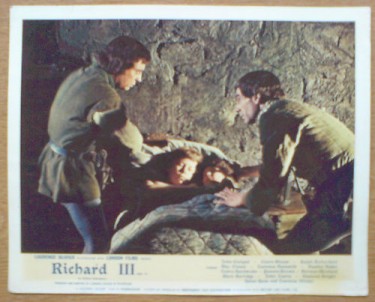 The above Film Still looks like the ‘Princes in the Tower scene.
The above Film Still looks like the ‘Princes in the Tower scene.
Richard III was released in the UK on 16 April 1955, with Queen Elizabeth II and Prince Philip attending the premiere.Alexander Korda had sold the rights to the film to NBC in the U.S.A for $500,000 and the film was released there on Sunday, 11 March 1956.
This film release was unique in that it had its U.S. premier on the same day both on television and in cinemas, the first instance of this ever.
The film, although slightly cut for television, was generally well received by critics, with Olivier’s performance earning particular notice, but due to its simultaneous release through television and cinemas in the U.S., it was a box office failure, and many critics felt at the time that it was not as well-made as Olivier’s previous films. However, the airing on U.S. television received excellent ratings, estimated at between 25 and 40 million.
In addition, when the film was reissued in 1966, it broke box office records in many US cities. Its critical reputation has since grown considerably, and many critics now consider it Olivier’s best and most influential screen adaptation of Shakespeare.
The film’s failure at the U.S. box office, however, along with Korda’s death, ended Olivier’s career as a Shakespeare film director. Olivier had been planning to make Macbeth but one of his other major backers, producer Mike Todd died in a plane crash.
The Film was restored and remastered and released a few years ago – above.
Claire Bloom was only about 24 when this film was made
Claire Bloom was born in London on February 15, 1931. In 1948 she was cast as Ophelia in Hamlet. She won praise for her early movie role in Limelight (1952) with Charlie Chaplin . She successfully combined a stage career with films, and continued to star in both films and on television.
Laurence Olivier invited her to costar with him in his film of Richard III – See Above. Claire Bloom, who had just appeared on the cover of Life magazine, found that playing opposite Olivier, 24 years her senior, was ‘like being caught in an electric current’ but off stage much of the power and passion was gone.
She described him as having “a kind of false charm.”
‘Although deeply under Olivier’s spell, I was never remotely in love with him,” She said “and never, for one instant, confused my feelings for him with my love for Richard Burton.”
Olivier’s marriage to Vivien Leigh was in meltdown. ‘Perhaps he was trying to show her he could still enjoy success with young girls. In other words, for our own purposes, we were using each other.
She successfully combined a stage career with films, and continued to star in both films and on television.
During the filming of the battle scenes in Spain, one of the archers accidentally shot Olivier in the ankle, causing him to limp. Fortunately, the limp was required for the part, so Olivier had already been limping in the parts of the film already shot.
The British Film Institute has pointed out that, given the enormous TV audiences it received when shown in the USA in 1956 the film “may have done more to popularise Shakespeare than any other single work”.
The film’s promoters in the USA picked up on the fact that the cast included four knights (Olivier, Richardson, Gielgud and Hardwicke) and cleverly used this as a selling point. The four members of the cast who had already achieved British knighthood were all listed as “Sir….” in the film credits.
- Sir Laurence Olivier as Richard, Duke of Gloucester (later King Richard III), the malformed brother of the King, who is jealous of his brother’s new power, and plans to take it for himself. Olivier had created his interpretation of the Crookback King in 1944, and this film transferred that portrayal to the screen. This portrayal earned Olivier his fifth Oscar nomination, and is generally considered to be one of his greatest performances; some consider it his best performance in a Shakespeare play.
- Sir Cedric Hardwicke as King Edward IV of England, the newly-crowned King of England, who, with the aid of his brother, Richard, has secured his position by wresting it from Henry VI of the House of Lancaster. Hardwicke was a stage actor who had moved to the U.S. to pursue a film career. He was mainly known for supporting roles in Hollywood. This marked his only appearance in a film version of a Shakespeare play.
- Sir John Gielgud as George, Duke of Clarence, brother of the new King. Gielgud’s standing as the great stage Shakespearean of the decades immediately preceding Olivier’s career was a cause of a certain enmity on the part of Olivier, and it was known that he disapproved of Gielgud’s “singing” the verse (i.e. reciting it in an affected style that resembles singing).[5] Gielgud’s casting in this film can be seen as a combination of Olivier’s quest for an all-star cast, and the fact that Olivier had rejected Gielgud’s request to play the Chorus in Olivier’s 1944 adaptation of Henry V.
- Sir Ralph Richardson as the Duke of Buckingham, a corrupt official, who sees potential in Richard’s plans and eventually becomes a fellow conspirator when Richard goes too far. Richardson was a lifelong friend of Olivier’s, and was one of the great four theatrical knights of the 20th century along with Alec Guinness, Gielgud and Olivier. At first, Olivier wanted Orson Welles as Buckingham, but felt an obligation towards his longtime friend. (Olivier later regretted this choice, as he felt that Welles would have added an element of conspiracy to the film.) I think personally the he got the right man here. Orson Welles to my mind may have been too overpowering – About this time he appeared in Trouble in the Glen but he was way over-the-top in that and not very good.
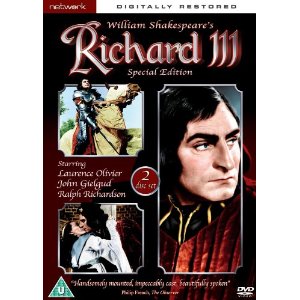
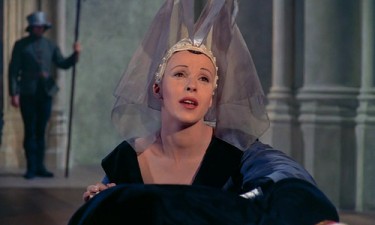
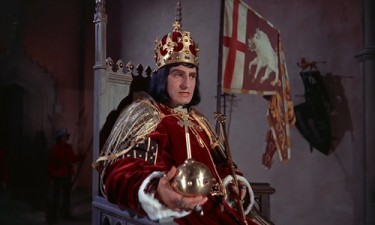
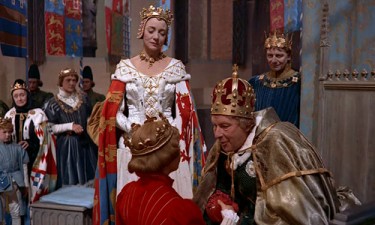
… [Trackback]
[…] Here you will find 73931 additional Information on that Topic: filmsofthefifties.com/richard-111-laurence-olivier-1955/ […]
… [Trackback]
[…] Read More Information here to that Topic: filmsofthefifties.com/richard-111-laurence-olivier-1955/ […]
… [Trackback]
[…] Find More Information here on that Topic: filmsofthefifties.com/richard-111-laurence-olivier-1955/ […]